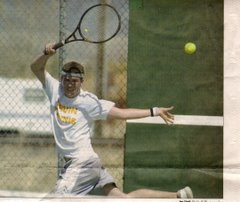Chinese Dynasty? Or Fluffery?
Two years ago I turned on the TV in the mid-summer for a little Acura Classic action. My favorite WTA Tour tournament was in full swing, and the '05 resurgence of Mary Pierce was on full display.
On this day, however, it was Kim Clijsters in the featured match, taking on a little-known Chinese player named Peng Shuai. Peng had been the shock of the tournament, beating Elena Dementieva and Dinara Safina on her way to the quarterfinals, where she faced Clijsters.
As the match began, I remember thinking what incredible power Peng had off of both sides. She hit the ball with two hands both on her forehand and her backhand, making her strokes lethal when she was in position for them. A short backswing made for an even more deadly pop when hit just right.
Peng wowed the San Diego local that night. I was pretty impressed too: she had beaten Clijsters in straight sets in a year that the Belgium baseliner was at her best.  (Peng Shuai in better times: the 2006 Strasbourg final. Photo by rAGEKID via flickr.)
(Peng Shuai in better times: the 2006 Strasbourg final. Photo by rAGEKID via flickr.)
Two years on, Peng Shuai sits one spot in the rankings behind her Acura Classic '05 spot: number 47. She is the second-highest ranked Chinese player behind Li Na, who is ranked 26th. Yan Zi is the only other Chinese woman in the Top 100 this week, however, sitting at a career high 72.
So are we in the age of a Chinese dynasty or fluffery?
That question is debateable, especially with the Beijing Olympics less than a year away. The development of many sports throughout the country of China at the turn of the century all was done with one goal in mind: high performance for the '08 Olympics.
Last year, the doubles team of Yan and Jie Zheng took two Grand Slam titles at the Australian Open and Wimbledon, cementing themselves among the game's elite doubles teams.
This year, however, the team wasn't able to defend either of their major titles, and the two women have dropped out of the Top Ten in the doubles rankings. Their once burgeoning confidence on the court has now dwindled as the Olympics grow nearer.
Though the rigid and straight-laced ways of the Chinese sports officials has helped get women's tennis this far, players like Li, who was the first Chinese player to make a Grand Slam quarterfinal in history, are beginning to realize that perhaps they can do things their own way.
In Guangzhou this week, Peng, a local favorite, was upset in prior to the quarterfinals of her home tournament - where no Chinese woman remains in the singles main draw.
Peng has seen mixed results since joining forces with Chinese-American Michael Chang midway through this summer. After beating Martina Hingis last week in Beijing to make the semifinals of the Tier II event, a letdown in Guangzhou has certainly sent shockwaves of disappointment through the Chinese sports world - but also shockwaves of truth.
The next year could prove pivotal for this country's future in women's tennis. Will a decade-long push for Olympic triumph be rewarded? Or have the Chinese women seen their stars come and go already, never to taste greatness again?

No comments:
Post a Comment